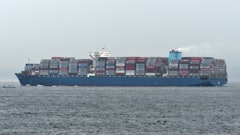March 23--WINTER HAVEN -- One of Florida's most controversial transportation projects in recent years is scheduled to begin operation April 2 at a new CSX high-tech rail terminal between Lake Wales and Wahneta, where cattle still outnumber people.
Three giant cranes will transfer cargo containers for consumer goods between freight trains and trucks at the 315-acre Winter Haven Terminal Facility that will serve the Tampa-Orlando corridor and beyond.
An adjacent 930-acre merchandise distribution center site to be developed for Fortune 500 companies such as Home Depot and Hewlett Packard will enhance the state's supply chain from the epicenter of Florida's population growth, said officials at Jacksonville-based CSX, which has 21,000 miles of track in 23 states.
The opening will end a chapter on a politically contentious $432 million state-CSX funding deal involving the terminal project and related issues, and begin a new one highlighting the state's population and economic growth and clearing tracks to open Orlando to commuter rail in May.
An HDR Engineering Inc. study projected the rail center would create a $10 billion economic impact over 10 years.
Orlando will gain more from the new terminal and a change in CSX freight routes initially, while the Tampa Bay region will benefit indirectly at first, then more directly when the distribution center gets rolling, officials said.
"Obviously, with the CSX terminal sitting just 40 miles or so from Tampa, it is another example of the Tampa Bay-I-4 corridor growing as a distribution gateway for Florida," said Wade Elliott, vice president of marketing and business development for Port Tampa Bay.
"Not only is Florida overtaking New York in population as the nation's third largest state, the I-4 corridor today has the largest concentration of distribution centers. With the population growth centered (here) it's no coincidence CSX is in the center."
Port Tampa Bay has a strong working relationship with Jacksonville-based CSX Corp., and will continue operations at its intermodal (truck-rail) freight terminal east of Tampa and its automobile distribution facility north of Tampa International Airport.
Port Tampa Bay also boasts of CSX rail on one of its docks that primarily serves trains carrying ethanol into the seaport. Another business just getting started is "Green Express" rail service for refrigerated cargoes, mostly fruit, that the port ships to the Midwest.
"In terms of Tampa, I don't see any harm to Port Tampa Bay with what Winter Haven does," said Carl Warren, director of Integrated Project Planning at CSX Intermodal Terminals Inc. "The Winter Haven terminal will bring more logistics activity into the center of the state and the synergies between Winter Haven and Tampa remain to be defined."
What is clear is that the new CSX operation will add a major competitive element to factors contributing to the ever-changing international and domestic trade patterns affecting the Tampa Bay region, including the expansion of the Panama Canal.
Many news accounts cite conventional wisdom and enthusiastic Florida elected officials who say bigger container cargo ships served by the wider canal will increase trade at Florida ports.
That possibly could affect cross-country rail shipments of container cargo from West Coast seaports to Florida, and beyond. However, two major factors frequently are overlooked.
The first is that any increase in cargo volume must be driven by an increase in consumer demand, not simply bigger ships crossing the canal, participants stressed at January's American Association of Port Authorities 2014 Shifting International Trade Routes conference in Tampa.
In addition, exporters and importers control the routing of cargo, based on how and where it's most economically feasible for shipments to be transported.
"The economics of the global supply chain are based on (this kind of) decision: "Am I better off leaving a container for more time to travel through the Panama Canal or better off shipping it (cross country) on land transportation into Florida," CSX's Warren said.
So CSX is confident it will continue to expand its international cargo shipment business into Florida, along with lucrative domestic container cargo shipments by rail from the Midwest, East Coast and West Coast.
In recent years, CSX has invested more than $2 billion to accelerate improvements along its Southeast U.S. corridor to better connect Florida with world trade.
CSX in a multi-faceted $432 million deal with the state of Florida sold its track through Orlando to make way for SunRail and used part of the funds to enhance its tracks between North Florida to Lakeland, a controversial arrangement former Gov Jeb Bush backed.
Critics raised questions about the price CSX paid while tension built up in Lakeland regarding additional freight trains stopping motorists at rail crossings. Initially CSX will run two trains in and two out daily to the WInter Haven terminal.
Proponents say Orlando should benefit from CSX taking freight trains off city street crossings during the daytime hours when SunRail commuter trains operate.
The Winter Haven Terminal Facility, with 14 miles of new track at the facility, will employ 55 workers in the first of two phases of development.
Hundreds more jobs are expected to be created once the distribution center attracts businesses to more than 7 million square feet of buildings that are envisioned, local officials said.
Copyright 2014 - Tampa Tribune, Fla.




























